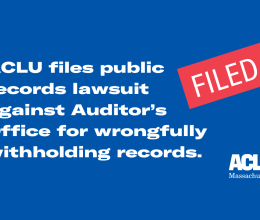
Today, the American Civil Liberties Union of Massachusetts filed a friend-of-the-court brief in a case brought by the animal rights group People for the Ethical Treatment of Animals (PETA) against the Massachusetts Department of Agricultural Resources. Relying on a little known exemption under the state public records law, the agency refused to make public the names and business contact information of people involved in the sale and transport of non-human primates for research--the subject of a public records request by PETA.
Under the public records law, all government documents are presumed public and must be released unless they fit into one of the narrow exemptions that the Legislature created. This provision, known as "Exemption N," allows government agencies to withhold documents related to the safety and security of buildings, people and critical infrastructure, but it can be used only if the agency also shows that releasing the documents would jeopardize public safety. Passed in the wake of the September 11th attacks--the provision, which applies to records such as blueprints, threat assessments and security measures--was a reaction to concerns that such documents could help a would-be terrorist plan an attack in Massachusetts.
"This is an exemption that, if read too broadly, threatens to swallow the rule," said ACLU of Massachusetts attorney Laura Rótolo. "The exemption was not meant to apply to every document under the sun. It was meant to protect certain sensitive security documents that could jeopardize public safety if released, balanced against the public's right to access. The documents at issue here simply don't fit that list."
PETA seeks contact information for sellers and transporters of laboratory animals, not security plans or infrastructure information. Still, the Department of Agricultural Resources reasoned that by identifying animal researchers, the information could jeopardize public safety. The Superior Court in Suffolk County upheld the Department's decision, and PETA appealed to the Appeals Court.
In its brief, the ACLU of Massachusetts argues that the records in question are not the kind of records that the Legislature envisioned when it passed Exemption N, and that the court was wrong to grant the agency a "heightened level of deference." PETA's request differs vastly from the concerns of the post-9/11 context in which the law was passed.
The ACLU of Massachusetts has long advocated for a narrow reading of exemptions to the public records law, in keeping with the public's right to access documents that shed light on the workings of its government. It also continues to push for a broader reform of the state public records law, which has not seen a significant update since 1973, and places Massachusetts near the bottom of national rankings of state government transparency.






